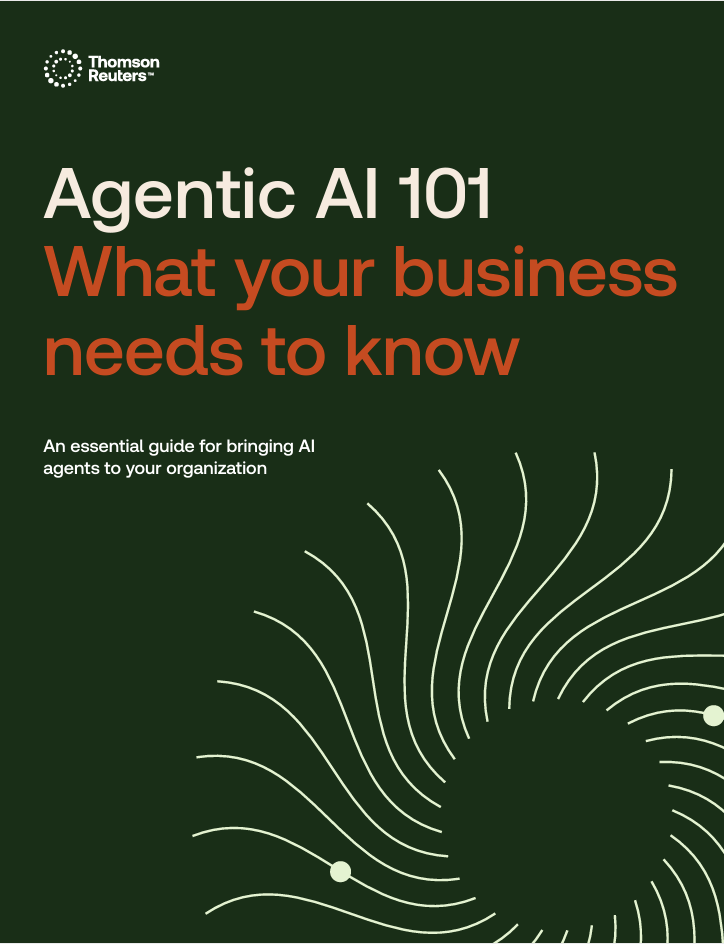What legal professionals need to know now with the rise of agentic AI
Competition in the legal industry is fierce, and industry professionals are under pressure to grow their firms by doing more. The need to manage more cases, meet tighter deadlines, engage in more sophisticated work—and for government professionals, to do so on stricter budgets—is a reality for practices everywhere.
Thankfully, technological advancements such as automation, generative AI (GenAI), and agentic AI tools are already making it possible for legal professionals to do more of everything. In particular, agentic AI systems are proving to be valuable across many legal use cases because of their ability to carry out complex tasks in real time and more quickly make sense of large datasets.
While GenAI can create documents or answer questions, agentic AI takes intelligence a step further by planning how to get multi-step work done, including tasks such as consuming information, applying logic, crafting arguments, and then completing them. This leaves legal teams more time for nuanced decision-making, creative strategy, and relationship-building with clients—work that machines can’t do.
Jump to ↓
Why is agentic AI a good fit for legal work?
Use cases: How legal teams are using agentic AI
Why legal professionals must choose AI wisely
How to optimize legal workflows today
Why is agentic AI a good fit for legal work?
Professional-grade agentic AI is software that, once given initial instructions, can make decisions and complete legal workflows, breaking down complex tasks into subtasks, executing them, and evaluating their progress, much like a human would.
AI agents are powered by large language models (LLMs), which are trained on vast amounts of legal and natural language data to understand, generate, and apply information with human-like fluency. Unlike traditional AI tools like such as basic chatbots or search functions, agentic AI has the capacity to connect the dots–such as sifting through case law and then applying its findings to draft documents–integrating across tools and platforms to eliminate inefficiencies.
What this means is that legal organizations have entered a new era in which lawyers with agentic AI can now spend more time doing the work they love, like strategic thinking and winning new clients, while the agentic AI handles the tedious, time-consuming, and non-billable tasks–from file formatting to extracting relevant information from correspondence or drafting briefs.
But even with all these advantages, it’s important to remember that agentic AI can only augment legal professionals—not replace them. Human oversight is vital, especially for high-stakes tasks where precision, judgment, and ethical responsibility are essential.
These agentic capabilities do not live in the future—legal professionals around the globe are already using and benefiting from them today. Several large law firms have been early adopters of agentic AI to create internal efficiencies and even build client-facing products, positioning themselves ahead of the curve. Firms and public legal teams not yet embracing this technology should start today or risk falling behind.
Use cases: How legal teams are using agentic AI
The practice of law demands more than just intelligence; it requires accuracy, efficiency, and reasoning. Unlike basic automation tools, agentic AI solutions operate with the contextual awareness and strategic thinking that even risk-intensive legal work requires. In addition to more rote tasks such as automating client intake forms, tracking hours, and summarizing legal research, legal professionals can use agentic AI for:
Document drafting and review
Agentic systems can adapt language based on jurisdiction, counterparty history, and risk profiles. Multi-stage quality control makes the agent able to review drafts against firm standards, recent precedents, and client requirements, catching inconsistencies human reviewers might miss. Version management explains revisions, highlights strategic shifts, and maintains institutional knowledge of clause evolution, allowing partners to generate and review complex agreements in minutes rather than hours.
Case preparation support
Agentic AI with precedent analysis amplifies litigation teams’ ability to identify patterns in judicial reasoning, as well as suggests persuasive approaches tailored to specific courts and judges. Argument gap detection alerts users about potential counterarguments and evidentiary weaknesses. Additionally, an agent can generate a plan for distributing research tasks to associate teams based on expertise and workload. This helps boost productivity and has the potential to accelerate professional growth.
Government legal professional applications
For public sector attorneys, agentic AI surfaces relevant statutes across jurisdictions while analyzing proposed legislation against existing frameworks. This makes the process of identifying conflicts and implementation challenges easier and faster. Tools that support cross-agency collaboration can help legal teams stay organized by routing support requests intelligently and setting the right priorities. Standardized language makes sure everyone’s on the same page regardless of department, while still allowing for the flexibility needed to adapt to different situations.
Why legal professionals must choose AI wisely
The right agentic AI solution functions as a partner that understands all aspects of legal practice. But not every solution with “agentic AI” in the name provides the sophisticated capabilities legal professionals require, and the differences matter profoundly.
Your reputation, client relationships, and professional obligations deserve technology built with the same care and judgment you bring to your legal work. When accuracy, security, and professional standards matter, which agentic AI tool you choose matters even more. The most powerful legal technology only delivers value when it’s trustworthy enough for the professional context in which it operates.
While consumer-grade AI offers convenience, professional legal practices require purpose-built systems that draw from respected legal repositories, not general internet data. True professional-grade agentic AI delivers validated search capabilities tested against industry benchmarks, robust security infrastructure designed for confidential client information, and seamless integration with your existing technology. Choosing inadequate solutions exposes your firm to significant risks, ranging from ethics violations and inaccurate work product to potential data breaches and compliance failures.
Get the full checklist for evaluating agentic AI in our e-book.
How to optimize legal workflows today
The path to transformation doesn’t require radical change, just purposeful first steps. The key is to follow a strategic progression. Begin with low-risk applications such as deposition summaries and contract analysis that operate independently of your workflows. This builds confidence and familiarity before moving on to higher-stakes implementations and more sophisticated integrations.
You can expect a significant leap forward with the upcoming introduction of agentic AI-powered legal solutions. We are poised to roll out agentic systems across legal domains, elevating existing experiences with full agentic orchestration. This means that soon, you will be able to use a solution that applies agentic AI capabilities to not only generate output but also plan, execute, and adapt across tools in real-time, streamlining complex tasks and enhancing productivity.
If you don’t want to risk falling further behind but aren’t sure where to start, download Agentic AI 101: What your business needs to know now for tips and strategies on bringing agentic AI to your practice.

CoCounsel Legal
Work smarter with CoCounsel, seamlessly integrated with Westlaw, Practical Law, Microsoft 365, and DMS partners
Go professional-grade AI ↗









